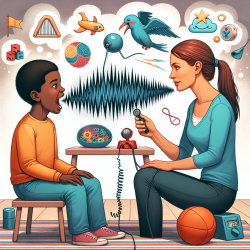As practitioners dedicated to creating great outcomes for children, understanding and implementing evidence-based strategies is crucial. One such area where we can make a significant impact is in enhancing affectionate behavior in children with Asperger Syndrome (AS). The research article "Increasing the Understanding and Demonstration of Appropriate Affection in Children with Asperger Syndrome: A Pilot Trial" provides valuable insights and practical applications that can help improve our practice.
Children with AS often struggle with understanding and expressing affection appropriately. This can lead to social difficulties and increased stress for both the children and their families. The pilot trial conducted by Sofronoff et al. (2011) aimed to address these challenges through a 5-week cognitive-behavioral intervention. Here are the key takeaways and how you can apply them in your practice:
Key Findings from the Study
- Improvement in Affection Appropriateness: The study found a significant increase in the appropriateness of affectionate behavior towards others, including giving affection and communicating empathy.
- Understanding the Purpose of Affection: Children showed a significant improvement in their understanding of why affectionate behavior is important.
- Parental Observations: Parents reported improvements in their child's affectionate behavior, including increased awareness and tolerance of affection.
Practical Applications for Practitioners
Based on the study's findings, here are some strategies you can implement in your practice:
1. Structured Group Sessions
Consider organizing small group sessions where children can learn and practice affectionate behaviors in a controlled environment. This approach was effective in the study and can help children with AS understand and demonstrate appropriate affection.
2. Use of Visual Aids
Incorporate visual aids and concrete concepts to help children understand and rate their feelings. The study used visual scales and post-it stickers, which can be easily adapted to your sessions.
3. Role-Playing
Role-playing different scenarios can help children practice and reinforce affectionate behaviors. This method was used effectively in the study to teach children how to express affection appropriately.
4. Parental Involvement
Engage parents in parallel sessions to ensure they are equipped to support their child's learning at home. Providing parents with strategies and tools can enhance the overall effectiveness of the intervention.
5. Regular Follow-Ups
Conduct follow-up sessions to assess progress and provide additional support as needed. The study found that improvements were maintained at follow-up, highlighting the importance of ongoing evaluation.
Encouraging Further Research
While the findings from this pilot trial are promising, more research is needed to fully understand and optimize interventions for children with AS. As practitioners, we should stay informed about the latest research and consider participating in or supporting further studies in this area.
To read the original research paper, please follow this link: Increasing the Understanding and Demonstration of Appropriate Affection in Children with Asperger Syndrome: A Pilot Trial.
By implementing these evidence-based strategies and staying engaged with ongoing research, we can make a meaningful difference in the lives of children with Asperger Syndrome and their families.










